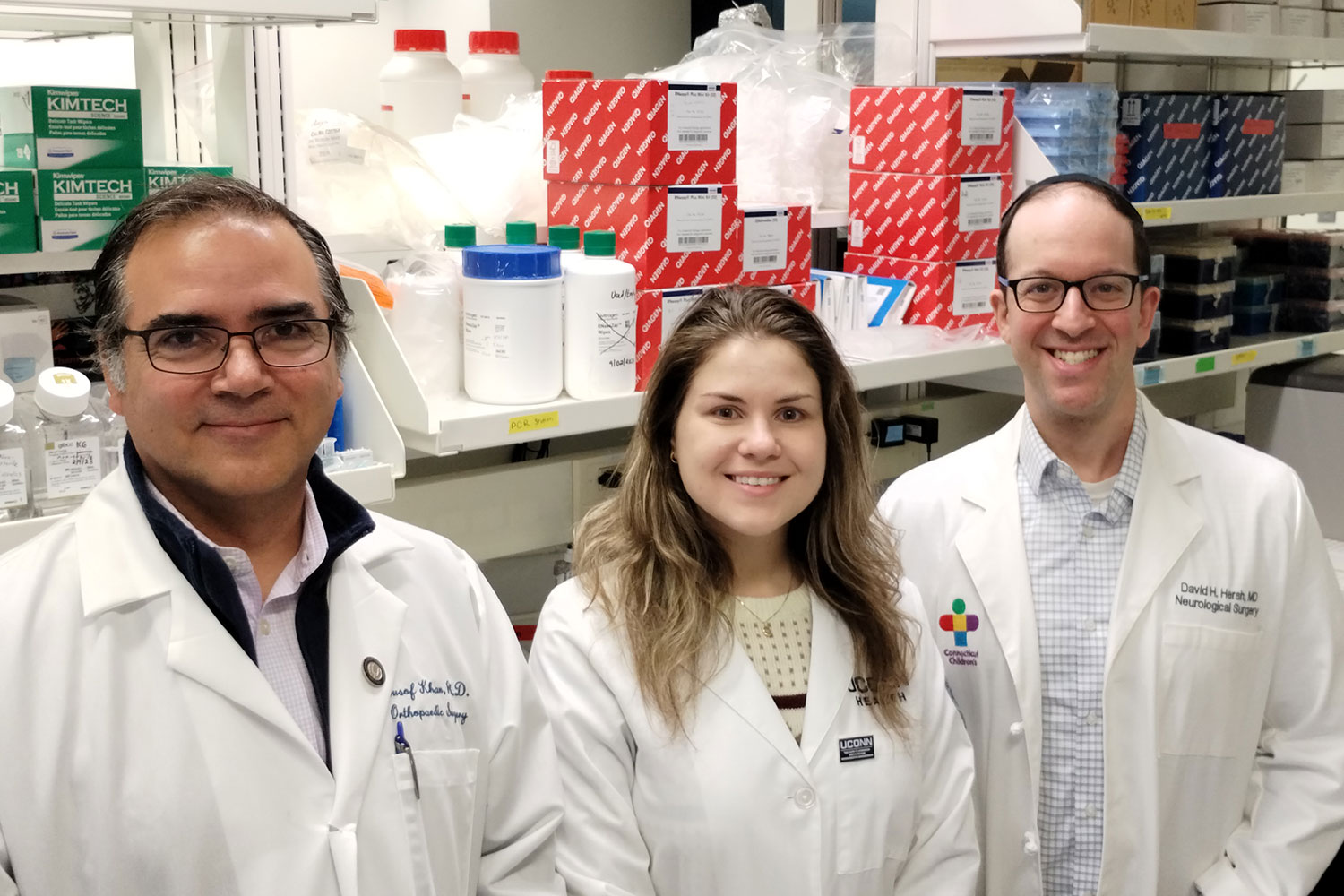
Schizophrenia is a complex and chronic mental disorder affecting more than 2 million people in the United States.
Finding appropriate medication to address the various symptoms of schizophrenia and improve the quality of life of these individuals is a constant challenge for psychiatrists and other health care professionals.
While antipsychotic medication remains the primary form of treatment for the so-called “positive” symptoms of schizophrenia (delusions, hallucinations, thought disorders), there is mounting interest in the medical community in using antidepressants – combined with antipsychotics – as a treatment for the disorder’s negative symptoms. The negative symptoms of schizophrenia are similar to those found in individuals with depression and are characterized by a lack of motivation or desire, lack of social relationships, and blunted affect and emotion.
Megan Ehret, a University of Connecticut pharmacologist specializing in mental disorders, recently surveyed the records of more than 1,500 schizophrenic patients at a Hartford, CT mental health center and found that more than 1 in 4 patients were given antidepressants as add-on medications at time of discharge.
While the reasons the patients received antidepressants were not identified in the study, Ehret notes that a vast majority of the patients did not have a co-diagnosis of depression, anxiety, or personality disorder. Ehret concludes, therefore, that the antidepressants were most likely given for the treatment of the negative symptoms of schizophrenia and the patients’ depressive state.
“This is a potentially important contribution to the field as there has been increased interest in recent years about both depressive and so-called “negative symptoms” that seem to occur in some patients with schizophrenia but not all,” says Dr. John W. Goethe, a psychiatrist and director of the Burlingame Center for Research and Education at the Institute of Living (IOL) in Hartford, where the study took place. Goethe served as a co-author of the study, along with Bonnie L. Szarek, a research nurse and project coordinator at the IOL, which is a division of Hartford Hospital.
“Prior studies suggest that in clinical practice there has been an increase in prescribing antidepressants along with the usual antipsychotic medications that these patients receive,” Goethe says. “While the rationale for this recently observed prescribing practice can only be inferred, it is possible that it is related to clinician-perceived depressive and/or negative symptoms that co-exist with the psychotic symptoms, such as hallucinations and delusions.”
While more research is warranted, the results suggest that the diagnostic criteria associated with the symptoms of schizophrenia, and other related illnesses such as schizoaffective disorder, may need to be more clearly defined – and related treatment protocols amended – to reflect a growing use of antidepressants by the medical community.
“Right now people are using antidepressants in schizophrenia for a variety of reasons,” Ehret says. “There is a lot of discussion in the area of psychology as to whether we are truly diagnosing schizophrenia or whether we are diagnosing schizoaffective disorder, which is another type of schizophrenia but has more of a mood component to it. There are many different reasons to use antidepressants and we want to be sure we are using them appropriately.”
The distinction in diagnosis is important as the American Psychiatric Association is in the process of amending its Diagnostic and Statistical Manual of Mental Disorders, 4th edition (DSM-IV) and reviewing its definitions of different psychiatric illnesses. The APA expects to publish a new version, the DSM-V, in 2013. The manual is the primary resource for the diagnosis of psychiatric illnesses used by mental health professionals.
Comprehensive Research
Ehret, an assistant professor of pharmacy practice in the University of Connecticut’s School of Pharmacy, presented her findings at the APA’s annual meeting in Hawaii in May. Goethe praised Ehret’s research and said he was unaware of any prior study that looked at so many demographic and clinical variables related to antidepressant use among schizophrenic patients or one that involved such a large patient sample.
The details of the study are as follows: Ehret reviewed the case histories of 1,519 patients diagnosed with schizophrenia at the IOL between February 2000 and July 2009. The patients ranged in age from 18 to 64 with 40 being the average age. Of that total, 425 or 28 % were discharged on antidepressants, mainly selective serotonin reuptake inhibitors (SSRIs).
Ehret said she was a bit surprised by the regularity with which the drugs were being prescribed.
“Twenty-eight percent is more than a quarter of the patients; that’s a substantial number to think about when the use of antidepressants is not high up on the treatment protocol,” Ehret says.
The study showed that what type of schizophrenia a patient had – catatonic, paranoid, disorganized or the undifferentiated type – made no significant difference in whether they received antidepressants. The patient’s age, sex, length of stay, and rate of readmission also did not appear to be a factor.
Interestingly, despite their regular use, antidepressants did not substantially reduce patients’ length of stay at the institution or reduce their readmission rate when compared to patients not on the drugs. Nor, says Ehret, did the use of antidepressant drugs appear to significantly increase length of stay, readmission rate, or cause substantial side effects when interacting with other drugs.
“Right now all we can say with this study is that these antidepressants aren’t going to hurt you. You’re going to do at least as well as people who don’t get them,” Ehret says. “We don’t know how much better you can get with them. There have been several small studies showing you can get better, but we don’t know.”
If it is found that antidepressants do indeed improve the quality of life for patients with schizophrenia, than the current medical protocols may need to be amended, Ehret says. Clarifying the issue is important in the interest of providing quality care. Mental health professionals know that most patients with schizophrenia respond better the earlier treatment begins.
“As a pharmacist, I know that the quicker you treat someone with schizophrenia, the better their long term prognosis,” says Ehret. “I also know that the more options you have available to a patient, the better. What we need to find out is – is there a combination of antipsychotic medications and antidepressants that works best; should we alter the DSM guidelines; when is it best to start these medications and what is the best dose to start on?”


